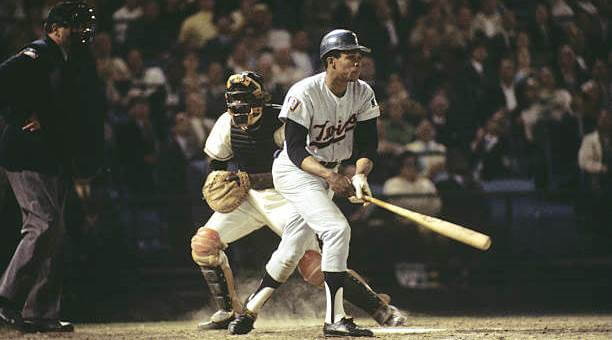MINNESOTA 4, CHICAGO 3 IN MINNESOTA
Date: Friday, June 18.
Batting stars: Rod Carew was 3-for-4 with a double and a stolen base, his fourth. Leo Cardenas was 2-for-4 with a home run (his eighth) and two runs.
Pitching stars: Jim Perry pitched seven innings, giving up three runs (two earned) on seven hits and a walk and striking out four. Ron Perranoski pitched two perfect innings.
Opposition stars: Carlos May was 2-for-4 with a triple and a double. Lee Richard was 2-for-4. Lee Maye was 1-for-4 with a two-run homer. Terry Forster struck out three in 2.1 scoreless innings, giving up two hits. Bart Johnson pitched two shutout innings, giving up a hit and a walk.
The game: Perry gave a foreshadowing of Brad Radke, giving up two runs in the first inning when Richard reached on an error and Maye homered. The Twins put men on second and third with none out in the first inning but did not score. Cardenas got them on the board in the second, leading off the inning with a home run to make the score 2-1 Chicago.
It stayed 2-1 until the fourth. Cardenas reached on an error and Jim Holt singled, putting men on first and third with none down. With one out, Perry laid down a squeeze bunt to tie the score. Cesar Tovar then put the Twins ahead with an RBI double and Carew provided an insurance run with a run-scoring single, making the score 4-2 Minnesota.
The White Sox came back in the sixth. With two out May tripled and scored on Jay Johnstone's double. The tying run was in scoring position, and a Tom Egan walk put the go-ahead run on base, but Mike Andrews fouled to the catcher to end the threat. Chicago got only one hit after that and did not advance a man past first base.
WP: Perry (10-5). LP: Tom Bradley (6-6). S: Perranoski (4).
Notes: Harmon Killebrew was at third base in this game, with Rich Reese at first. That happened quite often, but Killebrew was more often at first base, with Steve Braun generally manning third.
Oliva was leading the team in batting at .381. He would finish at .337. This was the year Oliva suffered the knee injury that would curtail his career. He was only thirty-two--one can only imagine what he might have done otherwise.
Tovar was also above .300, at .308. He would finish at .311.
Carew was batting just .239 at this point in the season. It would be interesting to know what was written about that at the time. He would get straightened out, and would finish at .307.
Reese was batting just .173 at this point, which may be why Killebrew was spending more time at first base. Reese would finish at just .219 with a .623 OPS. He'd had an outstanding year in 1969, a decent year in 1970, but then was pretty much done.
Perry had a down year, although he was not awful by any means: 17-17, 4.23, 1.35 WHIP. The Twins had two fine starters in Bert Blyleven (16-15, 2.81) and Jim Kaat (13-14, 3.32), but struggled to find a fourth. Steve Luebber was awful and Ray Corbin was not very good. Tom Hall was the best of the bunch, but the Twins thought he was more valuable in the bullpen.
They may have been right, because Perranoski, who had been excellent for the Twins from 1968-1970, struggled mightily in 1971. He was 1-4, 6.75, 2.06 WHIP before being waived in July. He never had a good season again. He was thirty-five at this point, and apparently all those seasons of over 100 relief innings finally took their toll.
Tom Bradley started for the White Sox. He pitched 3.2 innings, giving up four runs (one earned) on seven hits and a walk and striking out three. He wasn't a great pitcher, but he had two excellent years (1971-1972) with the Sox and one good year (1973) for the Giants. He threw 764.2 innings in those three years, which may be why he was done at age twenty-seven.
At least I kind of remembered that there had been a pitcher named Tom Bradley. I have no memory whatsoever of Lee Richard. It's understandable, because this is the only season he got a decent amount of playing time. An infielder, he had 260 at-bats and batted .231 with an OPS of .590. Presumably he was a good fielder. And to be fair, he was only twenty-two, so Chicago probably assumed he would improve. He didn't. He played in parts of four more seasons, but was never more than a futility infielder. For his career he batted .209/.259/.270 in 535 plate appearances. I've quoted this line before, but as some old scout said about the five tools, none of the others mean much if you can't hit.
This was the fifth game of a six-game winning streak for the Twins.
Record: The Twins were 33-32, in third place in the American League West, 10 games behind Oakland. They would finish 74-86, in fifth place, 26.5 games behind Oakland.
The White Sox were 22-37, in sixth (last) place in the American League West, 18 games behind Oakland. They would finish 79-83, in third place, 22.5 games behind Oakland.
Random Record: The Twins are 30-27 in Random Rewind games.

